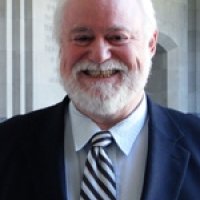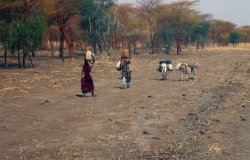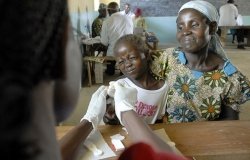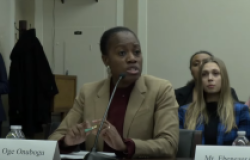Africa's Youth and Innovation Potential for Peacebuilding and Sustainable Development
On Thursday, June 26th the Africa Program hosted a panel made up of Ernest Acheampong, a Southern Voices Scholar and Researcher at the African Technology Policy Network, and Sarah Sladen, a Senior Manager of International Youth Development at InterAction. Both speakers discussed issues related to Africa’s youth, development, and educational policy. The discussion was moderated by the Africa Program’s Public Policy Scholar, Steve McDonald.
Overview
On Thursday, June 26th the Africa Program hosted a panel made up of Ernest Acheampong, a Southern Voices Scholar and Researcher at the African Technology Policy Network, and Sarah Sladen, a Senior Manager of International Youth Development at InterAction. Both speakers discussed issues related to Africa’s youth, development, and educational policy. The discussion was moderated by the Africa Program’s Public Policy Scholar, Steve McDonald.
The Growth-Unemployment Mismatch
Mr. Acheampong began the discussion by outlining the economic paradox that exists between GDP growth and unemployment in Africa. Over the past ten years, sub-Saharan Africa has experienced a period of unprecedented GDP growth. Seven of the world’s fastest growing economies can be found in the region, making Africa the second fastest growing continent in the world after Asia, with growth rates that are set to double over the next 20 year period. However, GDP growth does not necessarily translate into job creation, and Africa is currently witnessing a Jobless Growth Phenomenon, whereby 60% of those aged 15 to 35 remain largely unemployed. These high unemployment numbers translate into feelings of widespread discontent, frustration, and hopelessness on the continent, with economic exclusion threatening to derail efforts aimed at maintaining stability, building peace, and promoting socioeconomic growth.
At the same time, however, Africa’s youth are growing more and more interconnected and informed due to global advancements in technology and communication. Mobile phones have become almost ubiquitous in African society, internet bandwidth has grown 20-fold since 2008, and this unprecedented access to personal technology is transforming lives and business.
The question remains, does Africa find itself on the precipice of a population crisis or will it be able to effectively harness its rapidly growing and youthful population to bring about cross-cutting social change and sustainable economic growth? Mr. Acheampong is an advocate for the latter scenario, and believes that Africa’s youth are growing more educated and passionate about effecting meaningful socioeconomic change on the continent. Simultaneously, Mr. Acheampong stated that Africa’s young entrepreneurs are tapping into the continent’s growing digital economy to help boost their own economic prospects – a phenomenon that is empowering Africa’s youth and driving social change.
Social Innovation and Technological Change
Mr. Acheampong gave the audience numerous examples for ways in which this is occurring. Technology hubs, labs and business incubators have sprung up at a rapid pace in the past years, whereas non-conventional centers for learning (such as the Ashesi University in Ghana and elsewhere) have helped to cultivate a new generation of socially innovative African leaders. Mr. Acheampong also brought several examples of globally-utilized technologies that were, in fact, created in Africa to the attention of the audience – namely Ushahidi and Mpesa.
The United States, the United Nations and the African Union are starting to pay attention to these developments on the continent, as is evidenced by the AU’s 2009-2018 African Youth Decade Plan of Action, the UNESCO’s 2009-2013 Strategy on African Youth, and President Obama’s newly created Young African Leaders Initiative. All of these efforts are designed to invest in the next generation of African leaders. The challenge that remains is getting existing African leaders and governments to engage in effectively supporting these efforts at the state level. African governments must focus a larger portion of their attention on the youth if they wish for the unprecedented period of growth that has taken place in the past years to continue on into the future.
Youth in Global Perspective
Ms. Sladen, Director of the Alliance for International Youth Development (AIYD) at InterAction, does work that focuses on similar questions and has noticed a dramatic increase in the amount of attention being paid to the youth, not just in Africa, but the world over. Ms. Sladen was quick to emphasize, just as Mr. Acheampong had, that although Africa has experienced dramatic macroeconomic growth over the past years, that growth has not necessary translated into more jobs for the youth population. According to Ms. Sladen, this dilemma can be remedied through social innovation and the promotion of novel ideas and solutions, which gradually change beliefs and power structures, eventually acting as catalysts for broader socioeconomic transformation.
Inclusivity and Development Through Social Innovation
Ms. Sladen emphasized the need for the creation of enabling factors that both the private and public policy realm actively encourage on a sustained basis. The speaker noted that governments and institutions must work together to ensure that this new form of innovation does not morph into an elite phenomenon, so that the largest percentage of African youths possible benefit from these developmental strategies. In a word, existing leaders need to consider the obstacles that are confronting the youth on a daily basis, and develop intelligent policies, based on additional research and data, which prioritize the role of the youth in tomorrow’s societies. Within this context, the Southern Voices Program at the Woodrow Wilson Center acts a valuable resource.
Ms. Sladen interestingly noted that although more excitement and support in regards to social innovation and youth development currently exists, institutions still often times remain risk adverse and hesitant to invest in the youth. This leads us to the question of how can lenders remain accountable and frugal, but at the same time demonstrate and support innovation? According to Ms. Sladen, the answer to this predicament must come through additional capacity-building around the youth in developing countries, at the level of education reform, and the creation of a scholastic environment that prioritizes problem-solving skills and not just simply job-placement. Africa’s youth must be encourage to think outside the box, and African policymakers must be encouraged to support them.
Speakers
Hosted By

Africa Program
The Africa Program works to address the most critical issues facing Africa and US-Africa relations, build mutually beneficial US-Africa relations, and enhance knowledge and understanding about Africa in the United States. The Program achieves its mission through in-depth research and analyses, public discussion, working groups, and briefings that bring together policymakers, practitioners, and subject matter experts to analyze and offer practical options for tackling key challenges in Africa and in US-Africa relations. Read more
Thank you for your interest in this event. Please send any feedback or questions to our Events staff.











